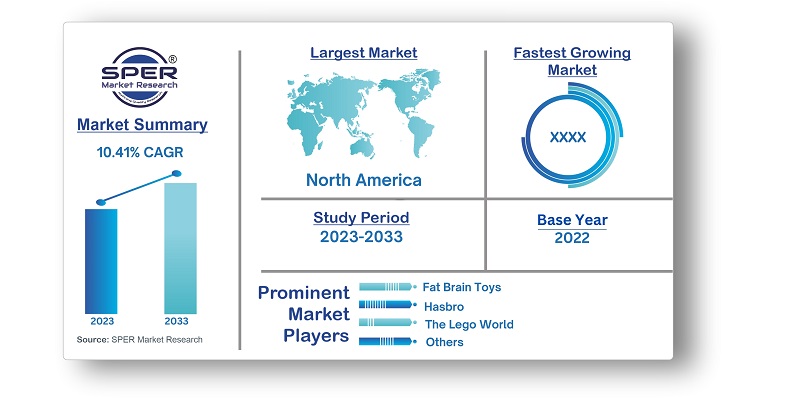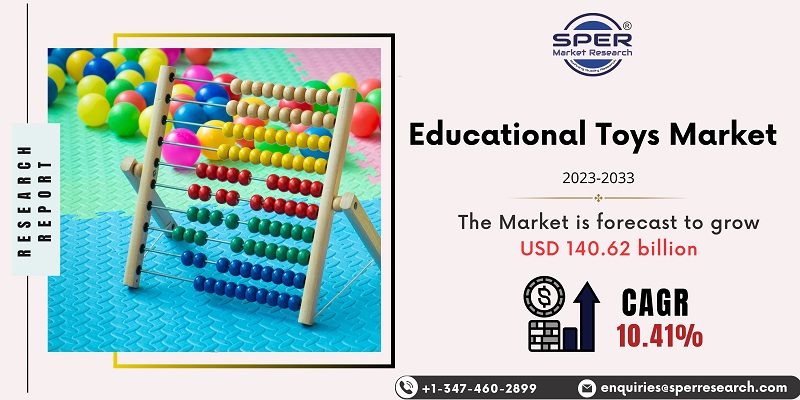
Educational Toys Market Growth, Size, Share, Trends, Revenue, Demand and Future Competition
Educational Toys Market Size- By Product Type, By Age, By Distribution Channel- Regional Outlook, Competitive Strategies and Segment Forecast to 2033
| Published: Nov-2023 | Report ID: EDUI2330 | Pages: 1 - 234 | Formats*: |
| Category : Education Industry | |||
- June 2021: Melissa & Doug recently revealed the debut of Timeless Toys, a new marketing initiative designed to reach more parents and introduce them to the company's products via digital channels like Amazon, YouTube, and Hulu.
- July 2022: As part of its Matchbox brand, Mattel and Elon Musk's SpaceX teamed up to launch a new range of toys with space themes. Furthermore, the toy manufacturer plans to release gear inspired by SpaceX on Mattel Creations, its web portal for collectors looking for exclusive products.


| Report Metric | Details |
| Market size available for years | 2019-2033 |
| Base year considered | 2022 |
| Forecast period | 2023-2033 |
| Segments covered | By Product Type, By Age, By Distribution Channel |
| Regions covered | North America, Asia-Pacific, Latin America, Middle East & Africa and Europe |
| Companies Covered | Fat Brain Toys, LLC, Hasbro, Mattel, Melissa & Doug, MindWare, Inc., Ravensburger, Sphero, Inc., Spin Master, The Lego World, VTech Holdings Limited, Others |
- Childcare Centers and Preschools
- Children
- Gift Buyers
- Parents and Caregivers
- Schools
- Teachers and Educators
- Therapists and Special Education Professionals
- Others
| By Product Type: | |
| By Age: | |
| By Distribution Channel: | |
| By Region: |
- Global Educational Toys Market Size (FY’2023-FY’2033)
- Overview of Global Educational Toys Market
- Segmentation of Global Educational Toys Market By Product Type (Art & Craft Kit, Building & Construction Sets, Games & Puzzles, Musical Toys/Instruments, Role Play Toys, STEM Toys, Others)
- Segmentation of Global Educational Toys Market By Age (Kindergarten, Preschoolers, Toddlers)
- Segmentation of Global Educational Toys Market By Distribution Channel (Offline, Online)
- Statistical Snap of Global Educational Toys Market
- Expansion Analysis of Global Educational Toys Market
- Problems and Obstacles in Global Educational Toys Market
- Competitive Landscape in the Global Educational Toys Market
- Impact of COVID-19 and Demonetization on Global Educational Toys Market
- Details on Current Investment in Global Educational Toys Market
- Competitive Analysis of Global Educational Toys Market
- Prominent Players in the Global Educational Toys Market
- SWOT Analysis of Global Educational Toys Market
- Global Educational Toys Market Future Outlook and Projections (FY’2023-FY’2033)
- Recommendations from Analyst
1.1. Scope of the report1.2. Market segment analysis
2.1. Research data source2.1.1. Secondary Data2.1.2. Primary Data2.1.3. SPER’s internal database2.1.4. Premium insight from KOL’s2.2. Market size estimation2.2.1. Top-down and Bottom-up approach2.3. Data triangulation
4.1. Driver, Restraint, Opportunity and Challenges analysis4.1.1. Drivers4.1.2. Restraints4.1.3. Opportunities4.1.4. Challenges4.2. COVID-19 Impacts of the Global Educational Toys Market
5.1. SWOT Analysis5.1.1. Strengths5.1.2. Weaknesses5.1.3. Opportunities5.1.4. Threats5.2. PESTEL Analysis5.2.1. Political Landscape5.2.2. Economic Landscape5.2.3. Social Landscape5.2.4. Technological Landscape5.2.5. Environmental Landscape5.2.6. Legal Landscape5.3. PORTER’s Five Forces5.3.1. Bargaining power of suppliers5.3.2. Bargaining power of buyers5.3.3. Threat of Substitute5.3.4. Threat of new entrant5.3.5. Competitive rivalry5.4. Heat Map Analysis
6.1. Global Educational Toys Market Manufacturing Base Distribution, Sales Area, Product Type6.2. Mergers & Acquisitions, Partnerships, Product Launch, and Collaboration in Global Educational Toys Market
7.1. Global Educational Toys Market Value Share and Forecast, By Product Type, 2023-20337.2. Art & Craft Kit7.3. Building & Construction Sets7.4. Games & Puzzles7.5. Musical Toys/Instruments7.6. Role Play Toys7.7. STEM Toys7.8. Others
8.1. Global Educational Toys Market Value Share and Forecast, By Age, 2023-20338.2. Kindergarten (5 years & Above)8.3. Preschoolers (3-5 years)8.4. Toddlers (1-3 years)
9.1. Global Educational Toys Market Value Share and Forecast, By Distribution Channel, 2023-20339.2. Offline9.2.1. Convenience Stores9.2.2. Supermarkets & Hypermarkets9.2.3. Others9.3. Online
10.1. Global Educational Toys Market Size and Market Share
11.1. Global Educational Toys Market Size and Market Share By Product Type (2019-2026)11.2. Global Educational Toys Market Size and Market Share By Product Type (2027-2033)
12.1. Global Educational Toys Market Size and Market Share By Age (2019-2026)12.2. Global Educational Toys Market Size and Market Share By Age (2027-2033)
13.1. Global Educational Toys Market Size and Market Share By Distribution Channel (2019-2026)13.2. Global Educational Toys Market Size and Market Share By Distribution Channel (2027-2033)
14.1. Global Educational Toys Market Size and Market Share By Region (2019-2026)14.2. Global Educational Toys Market Size and Market Share By Region (2027-2033)14.3. Asia-Pacific14.3.1. Australia14.3.2. China14.3.3. India14.3.4. Japan14.3.5. South Korea14.3.6. Rest of Asia-Pacific14.4. Europe14.4.1. France14.4.2. Germany14.4.3. Italy14.4.4. Spain14.4.5. United Kingdom14.4.6. Rest of Europe14.5. Middle East and Africa14.5.1. Kingdom of Saudi Arabia14.5.2. United Arab Emirates14.5.3. Rest of Middle East & Africa14.6. North America14.6.1. Canada14.6.2. Mexico14.6.3. United States14.7. Latin America14.7.1. Argentina14.7.2. Brazil14.7.3. Rest of Latin America
15.1. Fat Brain Toys, LLC15.1.1. Company details15.1.2. Financial outlook15.1.3. Product summary15.1.4. Recent developments15.2. Hasbro15.2.1. Company details15.2.2. Financial outlook15.2.3. Product summary15.2.4. Recent developments15.3. Mattel15.3.1. Company details15.3.2. Financial outlook15.3.3. Product summary15.3.4. Recent developments15.4. Melissa & Doug15.4.1. Company details15.4.2. Financial outlook15.4.3. Product summary15.4.4. Recent developments15.5. MindWare, Inc.15.5.1. Company details15.5.2. Financial outlook15.5.3. Product summary15.5.4. Recent developments15.6. Ravensburger15.6.1. Company details15.6.2. Financial outlook15.6.3. Product summary15.6.4. Recent developments15.7. Sphero, Inc.15.7.1. Company details15.7.2. Financial outlook15.7.3. Product summary15.7.4. Recent developments15.8. Spin Master15.8.1. Company details15.8.2. Financial outlook15.8.3. Product summary15.8.4. Recent developments15.9. The Lego World15.9.1. Company details15.9.2. Financial outlook15.9.3. Product summary15.9.4. Recent developments15.10. VTech Holdings Limited15.10.1. Company details15.10.2. Financial outlook15.10.3. Product summary15.10.4. Recent developments15.11. Others
SPER Market Research’s methodology uses great emphasis on primary research to ensure that the market intelligence insights are up to date, reliable and accurate. Primary interviews are done with players involved in each phase of a supply chain to analyze the market forecasting. The secondary research method is used to help you fully understand how the future markets and the spending patterns look likes.
The report is based on in-depth qualitative and quantitative analysis of the Product Market. The quantitative analysis involves the application of various projection and sampling techniques. The qualitative analysis involves primary interviews, surveys, and vendor briefings. The data gathered as a result of these processes are validated through experts opinion. Our research methodology entails an ideal mixture of primary and secondary initiatives.



Frequently Asked Questions About This Report
PLACE AN ORDER
Year End Discount
Sample Report
Pre-Purchase Inquiry
NEED CUSTOMIZATION?
Request CustomizationCALL OR EMAIL US
100% Secure Payment






Related Reports
Our Global Clients
Our data-driven insights have influenced the strategy of 200+ reputed companies across the globe.






















